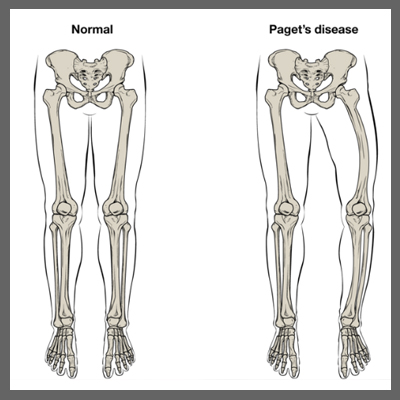

Paget's disease of bone interferes with body's normal recycling process, in which new bone tissue gradually replaces old bone tissue. Over time, the disease can cause affected bones to become fragile and misshapen. Paget's disease of bone most commonly occurs in the pelvis, skull, spine and legs.
The risk of Paget's disease of bone increases with age, any family members have the disorder. Complications of Paget's disease of bone can include broken bones, hearing loss and pinched nerves in spine.
Bisphosphonates — the medications also used to strengthen bones weakened by osteoporosis — are the mainstay of treatment. For patients who have complications, surgery may be necessary.
Most people who have Paget's disease of bone have no symptoms. When symptoms occur, the most common complaint is bone pain.
Because this disease causes body to generate new bone faster than normal, the rapid remodeling produces bone that's softer and weaker than normal bone, which can lead to bone pain, deformities and fractures.
The disease might affect only one or two areas of body or might be widespread. Your signs and symptoms, if any, will depend on the affected part of body.
The cause of Paget's disease of bone is unknown. Scientists suspect a combination of environmental and genetic factors contribute to the disease. Several genes appear to be linked to getting the disease.
Some scientists believe Paget's disease of bone is related to a viral infection in your bone cells, but this theory is controversial.
Factors that can increase your risk of Paget's disease of bone include:
In most cases, Paget's disease of bone progresses slowly. The disease can be managed effectively in nearly all people. Possible complications include:
Homeopathy is one of the most popular holistic systems of medicine. The selection of remedy is based upon the theory of individualization and symptoms similarity by using holistic approach. This is the only way through which a state of complete health can be regained by removing all the sign and symptoms from which the patient is suffering. The aim of homeopathy is not only to treat Paget’s disease but to address its underlying cause and individual susceptibility. As far as therapeutic medication is concerned, several remedies are available to treat Paget’s disease that can be selected on the basis of cause, sensations and modalities of the complaints. For individualized remedy selection and treatment, the patient should consult a qualified homeopathic doctor in person. There are following remedies which are helpful in the treatment of Paget’s disease:
Calcaria Phos,
Phosphoric Acid,
Fluoric Acid,
Phosphorous,
Calcaria Carb,
Ferrum Met,
Iodium,
Kreosote,
Ferrum Aceticum,
Iridium Met, and many other medicines.
OR AS DIRECTED BY PHYSICIAN